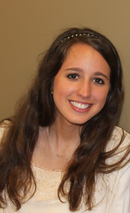
Hi, my name is Jamie. I am 20 years old, and I am from Mississippi. Although I have been at the Andi Leadership Institute for less than a week, I can already say that it has changed my life. As I interact with women from around the world, I learn so much about their cultures, about the conflict that they witness everyday, and the role women play in their communities. However, when I contemplate what makes their cultures so unique, I also find myself evaluating and analyzing my own. I cannot help but ask about my country’s own conflicts, how we approach conflicts both at home and abroad, and how we incorporate women into the process. I find myself realizing that while the U.S. has made great strides in the past century, we still face a long journey on the road to equality and peace. When I think about how far both the U.S. and the world has to travel, I remember:
That’s why I am here—that’s why we are all here—to gain ethical leadership skills, to understand others, and to connect to women traveling a similar path of peace building. Together we can face the journey ahead.
This idea of “together” is one of the key lessons I have learned this week. We are a team, a unit, and a world family. In just a few days, we have entered into a space of trust and support, where we can present our own thoughts and opinions and also know they will be heard with an open-mind. We are all here to understand, to learn, and to grow together.
I want to share with you a few lessons I learned this week from the other women. My roommate’s name is Minahil, and she is from Pakistan. In one of our first conversations, I was asking about her day-to-day life, and she was asking about mine. As the discussion about how women are viewed in society progressed, I realized that so often nations and people both subject others and are subjected to stereotypes. One of the world’s greatest flaws is that preconceived notions cloud how we listen to and understand others.
The next lesson I would like to share involves Heni, whom you have already met. She comes from a world where conflict strikes daily as Israel fights Hamas in the Gaza strip. Air strikes, bombs, and death—these are all realities that both sides face every day. When she asked about the conflicts in my own community in Mississippi (poverty, teen pregnancy, race and gender discrimination, the education system, and sexual health), I quickly brushed them off as trivial in comparison to facing a physical war everyday. Heni, whom I have learned over the past week is incredibly wise and insightful, explained that you cannot compare conflicts. No one conflict is “more worse” than the other. They are all different and by learning about their differences, we are better able to address our own.
These are just two of many eye-opening moments of the week. Everyone sees the world through different lenses, and I love listening to how they approach their own conflicts. In just six days, these women have already changed my life. They have become my teammates, my circle of trust, and most importantly, my friends. I’m ready to see what the next two weeks hold!
That’s why I am here—that’s why we are all here—to gain ethical leadership skills, to understand others, and to connect to women traveling a similar path of peace building. Together we can face the journey ahead.
This idea of “together” is one of the key lessons I have learned this week. We are a team, a unit, and a world family. In just a few days, we have entered into a space of trust and support, where we can present our own thoughts and opinions and also know they will be heard with an open-mind. We are all here to understand, to learn, and to grow together.
I want to share with you a few lessons I learned this week from the other women. My roommate’s name is Minahil, and she is from Pakistan. In one of our first conversations, I was asking about her day-to-day life, and she was asking about mine. As the discussion about how women are viewed in society progressed, I realized that so often nations and people both subject others and are subjected to stereotypes. One of the world’s greatest flaws is that preconceived notions cloud how we listen to and understand others.
The next lesson I would like to share involves Heni, whom you have already met. She comes from a world where conflict strikes daily as Israel fights Hamas in the Gaza strip. Air strikes, bombs, and death—these are all realities that both sides face every day. When she asked about the conflicts in my own community in Mississippi (poverty, teen pregnancy, race and gender discrimination, the education system, and sexual health), I quickly brushed them off as trivial in comparison to facing a physical war everyday. Heni, whom I have learned over the past week is incredibly wise and insightful, explained that you cannot compare conflicts. No one conflict is “more worse” than the other. They are all different and by learning about their differences, we are better able to address our own.
These are just two of many eye-opening moments of the week. Everyone sees the world through different lenses, and I love listening to how they approach their own conflicts. In just six days, these women have already changed my life. They have become my teammates, my circle of trust, and most importantly, my friends. I’m ready to see what the next two weeks hold!

 RSS Feed
RSS Feed